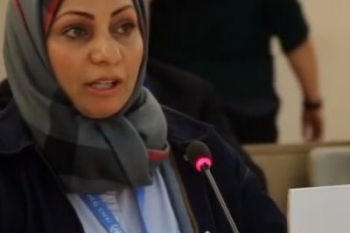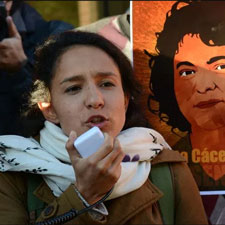At Amnesty International, #WeDefend the rights of human rights defenders. Join us.
By Guadalupe Marengo, Head of Global Human Rights Defenders Programme, Amnesty International
During the last few weeks, we have seen how attacks on human rights defenders continue to escalate all over the world as those in power increasingly become more averse to criticism and resort to a wide array of tactics to silence them.
 As I was starting to write this piece, I received the news of human rights defender Nabeel Rajab’s sentence to two years in prison for shedding light during TV interviews on allegations of human rights abuses in Bahrain. Also in Bahrain, Ebtisam al-Saegh was re-arrested last week in relation to her human rights work. She had already been detained in May, beaten and sexually assaulted during interrogation, and is at risk of being tortured again.
As I was starting to write this piece, I received the news of human rights defender Nabeel Rajab’s sentence to two years in prison for shedding light during TV interviews on allegations of human rights abuses in Bahrain. Also in Bahrain, Ebtisam al-Saegh was re-arrested last week in relation to her human rights work. She had already been detained in May, beaten and sexually assaulted during interrogation, and is at risk of being tortured again.
A few days earlier, we learned that the Chinese authorities were preventing Peace Nobel prize winner Liu Xiaobo from leaving the country to receive urgent medical treatment. Liu was recently released on medical grounds after being jailed in 2009 for 11 years for “inciting subversion of state power” after he co-signed a call for political reform in China. We heard the very sad news of his death yesterday.
In Turkey, ten human rights defenders, including our Amnesty International colleagues, were arbitrarily detained as they were attending a training workshop and remain incarcerated as I write. They are Idil Eser, Director of Amnesty International Turkey; İlknur Üstün, Women’s Coalition; Günal Kurşun, lawyer, Human Rights Agenda Association; Nalan Erkem, lawyer, Citizens Assembly; Nejat Taştan, Equal Rights Watch Association; Özlem Dalkıran, Citizens’ Assembly; Şeyhmuz Özbekli, lawyer; Veli Acu, Human Rights Agenda Association; Ali Gharawi and Peter Steudtner both consultants delivering the training. They are currently being investigated on suspicion of “membership of an armed terrorist organisation”, a ridiculous and baseless accusation. This follows last month’s arrest of Taner Kılıç, chair of Amnesty International Turkey, and scores of other human rights defenders and journalists that have been detained in recent months.
In Angola, Rafael Marques de Morais and Mariano Brás Lourenço have formally been charged with ‘defamation of a public authority’ and ‘outrage to a sovereign body’ in relation to an article they published on a questionable acquisition of public land by the Angolan General Public Prosecutor. Both charges carry a penalty of one and three years in prison, respectively. Similarly, Jean-Marie Kalonji, an activist with the youth movement Quatrieme voie/ il est temps campaigning for peace and democracy in the Democratic Republic of Congo (DRC), was arrested by military security forces in Kinshasa. His colleague and lawyer, Sylva Mbikayi, was arrested a few hours later when he attempted to visit Jean-Marie at the place where he was detained.
 In Honduras, Bertha Zúniga, coordinator of the Civic Council of Popular and Indigenous Organizations of Honduras (COPINH) and daughter of murdered human rights defender Berta Cáceres, was also attacked by the end of June. Bertha Zúniga and her colleagues, Sotero Chavarría and José Asunción Martínez were travelling by car, when individuals wielding machetes attempted to stop and attack them. That same week, unidentified intruders entered the home of Mario Luna Romero, a Yaqui Indigenous leader from northern Mexico fighting for the right to water in his community, and set fire to his partner’s car. To date, despite previous threats and attacks against him, no effective protection has been provided to him and his family.
In Honduras, Bertha Zúniga, coordinator of the Civic Council of Popular and Indigenous Organizations of Honduras (COPINH) and daughter of murdered human rights defender Berta Cáceres, was also attacked by the end of June. Bertha Zúniga and her colleagues, Sotero Chavarría and José Asunción Martínez were travelling by car, when individuals wielding machetes attempted to stop and attack them. That same week, unidentified intruders entered the home of Mario Luna Romero, a Yaqui Indigenous leader from northern Mexico fighting for the right to water in his community, and set fire to his partner’s car. To date, despite previous threats and attacks against him, no effective protection has been provided to him and his family.
In Guatemala, members of the Centre for Environmental, Social and Legal Action (CALAS) have been the target of a renewed smear campaign after they challenged the license of the San Rafael mining company in court and the Supreme Court of Justice notified the provisional suspension of the mining company’s licence. At the end of June, paid advertisements were published in a national and a regional newspaper signed by the suppliers of the San Rafael mining company, accusing CALAS of dividing the community. The situation in San Rafael remains highly tense and could facilitate further attacks against CALAS’ members.
In Venezuela, lawyers Raquel Sánchez and Raiza Ramírez received anonymous calls threatening them with prosecution by military courts and telling them to leave the country. Their crime? Defending people who have been arbitrarily detained and expressing concern at the repeated use of arbitrary detentions and military courts to prosecute civilians as a mean to silence dissent.
In Cambodia, the government decided also last week to ban the NGO coalition Situation Room from monitoring next year’s elections, in a blatant attempt to silence the work of civil society. In Hungary, we have seen the recent passing of a new NGO law that unduly restricts the right to association and stigmatises NGOs that receive foreign funding, in what is an escalating crackdown on critical voices in the country.
These are just some of the most recent attacks against human rights defenders worldwide, but the list is longer.
The attacks are relentless and I despair with the world leaders who are not doing enough to effectively protect those at risk for defending human rights. Instead of working to ensure a safe and enabling environment for human rights defenders and civil society, those in power are getting more and more averse to criticism and dissent, targeting those who are working to shed light on human rights abuses and challenge the abuse of power. And while the space for civil society continues to shrink, brave human rights defenders are still standing up against such abuses in every corner of the world.
Human rights defenders cannot operate effectively and contribute to making a safer, more just world unless adequately equipped and protected to carry out their work. But despite world leaders claims that they want a better world for all of us, they have not taken enough actions to revert the increasing risks and attacks human rights defenders are facing. That’s why these attacks are attacks on us all.
This week presents an important opportunity for states to reaffirm the key role and legitimacy of human rights defenders during the forthcomming High-Level Political Forum (HLPF), held under the auspices of the United Nations General Assembly and the Economic and Social Council, to review progress towards implementation of the Sustainable Development Goals, commonly known as the 2030 Agenda.
Will world leaders ensure that human rights are put at the forefront of the discussion? A first urgent step for them is to speak and act for the protection of human rights defenders.






















